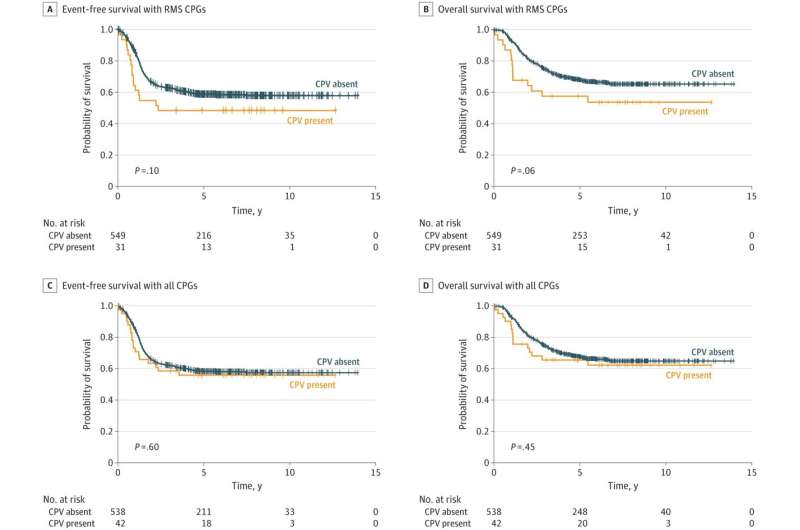This article has been reviewed according to Science X's editorial process and policies. Editors have highlighted the following attributes while ensuring the content's credibility:
fact-checked
peer-reviewed publication
trusted source
proofread
Cancer-predisposition variants associated with adverse outcomes in rhabdomyosarcoma

Germline cancer-predisposition variants (CPVs) can be helpful in predicting risk in some pediatric cancers. However, CPV risk association in children with rhabdomyosarcoma has not been well studied. A new report led by researchers at Baylor College of Medicine evaluates the association of germline CPVs with rhabdomyosarcoma outcomes in a cohort of children enrolled in Children's Oncology Group studies. The findings are published in JAMA Network Open.
"Compared to other pediatric cancers, survival for rhabdomyosarcoma has not improved in recent decades. One limiting factor in clinical practice is the imprecision of risk stratification strategies, which is why we wanted to study whether CPV presence can be used as a measure for high-risk cases," said corresponding author Dr. Philip Lupo, professor of pediatrics—hematology and oncology and director of the Epidemiology and Population Sciences Program at Texas Children's Cancer Center.
Researchers conducted an exome association analysis of outcomes among 580 children with rhabdomyosarcoma. The presence of CPVs in rhabdomyosarcoma-associated genes was associated with more adverse outcomes. Children with embryonal rhabdomyosarcoma and CPVs in the TP53 or HRAS gene had particularly poor outcomes. "These outcomes were not driven by a secondary malignancy, which is an important new finding that is in contrast to current understanding in the field," said Lupo, a member of the Dan L Duncan Comprehensive Cancer Center at Baylor.
Another important finding identified a group of individuals with CPVs who had not yet been recognized to have poor outcomes. Researchers observed that children with fusion-negative rhabdomyosarcoma and CPVs had comparable outcomes to children with no CPVs and fusion-positive rhabdomyosarcoma, an aggressive subtype known to have poor outcomes.
"The results of our study support germline testing for cancer-predisposition variants among children with rhabdomyosarcoma, which could aid in early clinical surveillance strategies for patients and cascade testing of family members," Lupo said.
"I'm excited that our research might lead to improving clinical guidelines for children diagnosed with rhabdomyosarcoma and their families. I hope that the findings of our paper will result in new discussions about how to improve survival for children diagnosed with cancer," said first author Dr. Bailey Martin-Giacalone, graduate student in Lupo's lab at Baylor at the time of research and currently a postdoctoral associate at Washington University in St. Louis.
More information: Bailey A. Martin-Giacalone et al, Germline Genetic Testing and Survival Outcomes Among Children With Rhabdomyosarcoma, JAMA Network Open (2024). DOI: 10.1001/jamanetworkopen.2024.4170


















